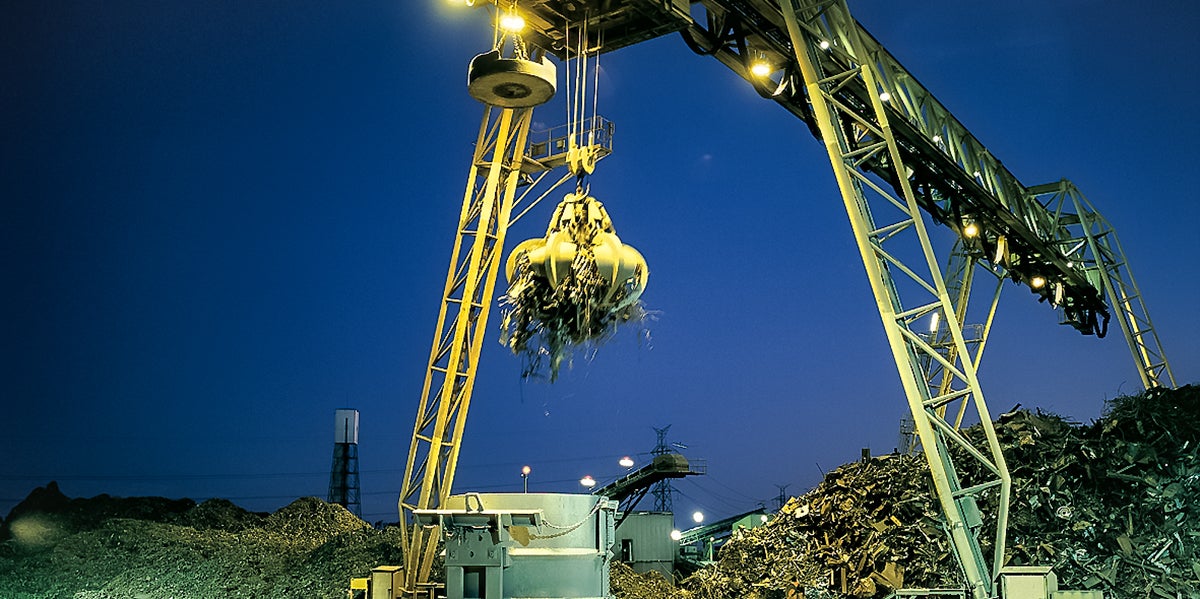Home / Our Stories /
Sorting is not recycling: Steel’s role in driving a circular economy
9 November 2021

I will start with a bold statement – metal is the next global ESG story. Decarbonisation of steel cannot happen without recycling of scrap metal and its participation in the circular economy of steel.
Steel is the building block of any society and with geo-political changes post COVID-19, steel manufacturing is now part of a resilient sovereign infrastructure – no different to water or electricity.
This week is National Recycling Week in Australia – the 25th year of the initiative and a time for all to reflect on the impact we have on the planet and environmental sustainability. We are no longer talking about recycling as simply a ‘feel good’ sentiment, but instead as a ‘mission critical’ for humanity. While there will be those who get on the band wagon this week and join the chorus, the question to be asked is: ‘what are we doing post sorting?’ Because sorting is not recycling. Recycling is participation of the resources recovered back into the economy – unless it is done and consumed, we are not doing recycling.
These themes, which are a focus for us every day at InfraBuild, take on extra clarity this year through the lens of the COP-26 event in Glasgow, and the international focus on sustainability and decarbonisation.
The steel industry is rising to this challenge. Ahead of COP-26, the Mission Possible Partnership, through its Net-Zero Steel Initiative (NZSI), released its roadmap for the global steel sector to reach net-zero emissions by 2050. The industry-backed roadmap includes, among other key areas, a focus on bringing zero-carbon primary steel production technologies to market by 2030 and accelerating the growth of scrap-based production.
For some time now, as part of our journey towards decarbonisation at InfraBuild, we have been contributing to the circular economy and a more sustainable society. We are already on the road to making sustainable steel.
Every year our domestic recycling facilities recover about 1.4 million tonnes of recycled metals for our Electric Arc Furnaces (EAFs) to manufacture the steel needed for residential and commercial construction, and Australia’s nation-building and infrastructure projects. Through this we make a significant contribution to our journey towards making low carbon emissions steel.
Consider this: in comparison to traditional blast furnace steelmaking, as an EAF steel manufacturer we produce steel with almost 80% reduction in carbon emissions per tonne of steel, and 64% less electricity use according to WorldSteel Association data. From an environmental viewpoint, it’s good for the planet.
We significantly reduce the amount of scrap steel that is either thrown out or dumped illegally. By upcycling scrap metal through our EAFs in Sydney and Melbourne, we reduce the drain on natural resources, such as iron ore and coking coal, that are required when making primary steel through blast furnace methods.
Recycling one tonne of steel scrap saves 1.5 tonnes of CO2, 1.4 tonnes of iron ore, 740kg of coal and 120kg of limestone. Globally, around 650 Mt per year of scrap is consumed each year for steel production. This avoids the emission of about 975 Mt of CO2 annually and significantly reduces the use of natural resources.

With 26 recycling facilities around Australia, we offer local recycling solutions for households, local government, mining, demolition, automotive and waste companies. Our recycling capabilities and service helps everyone participate in the circular economy. We provide a pathway from collection, to processing and ultimately transforming scrap metal into a valuable resource and providing a socially, environmentally, and economically responsible alternative to landfill. And this extends around the world through our global operations, with scrap metal facilities in the US (Tampa, Florida and LaPlace, Louisiana) and our recycling export terminal in Gdansk, Poland.
Recycling metal reduces pollution, saves resources, and reduces waste going to landfill. Coupled with the fact that steel is recyclable over-and-over again with no loss in quality each time, it’s clear that metals recycling is an integral part of the circular economy. It’s good for future generations.
We can all help with metals sorting – let us recycle it for you.
Vik Bansal is the CEO and Managing Director of InfraBuild.
Please contact us for any feedback or media enquiries about this content.
Subscribe to the
InfraBuild newsletter
Receive regular updates on news, case studies as well as the latest products and services.
